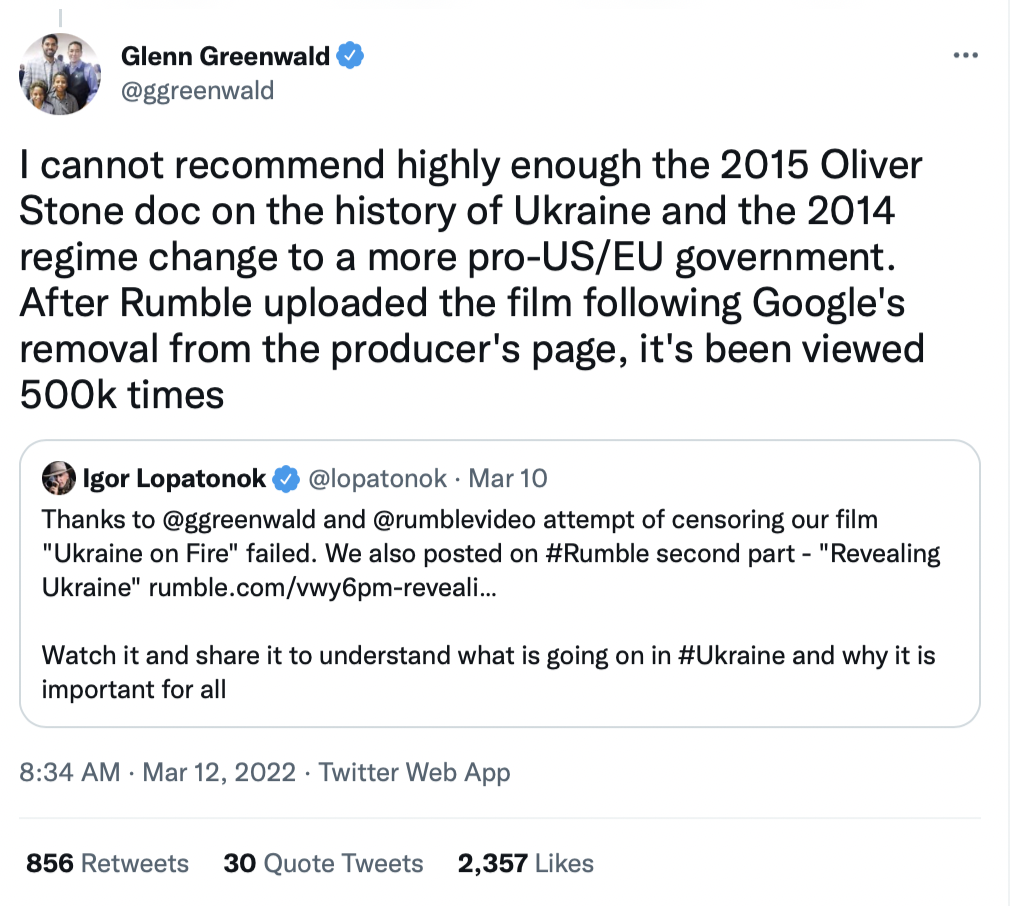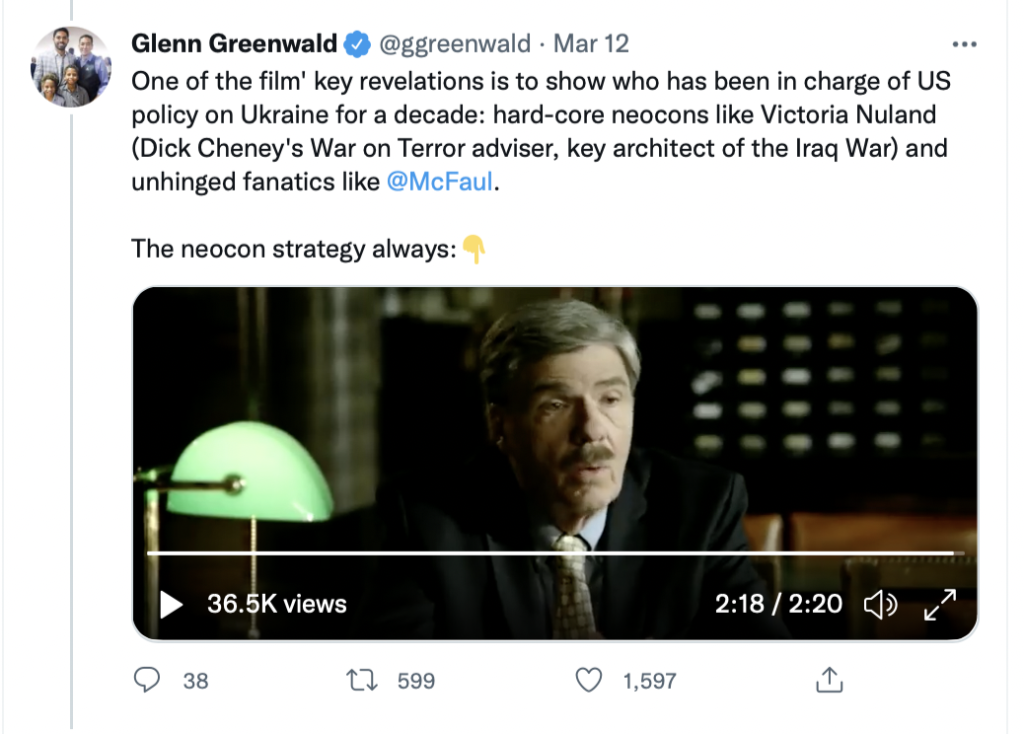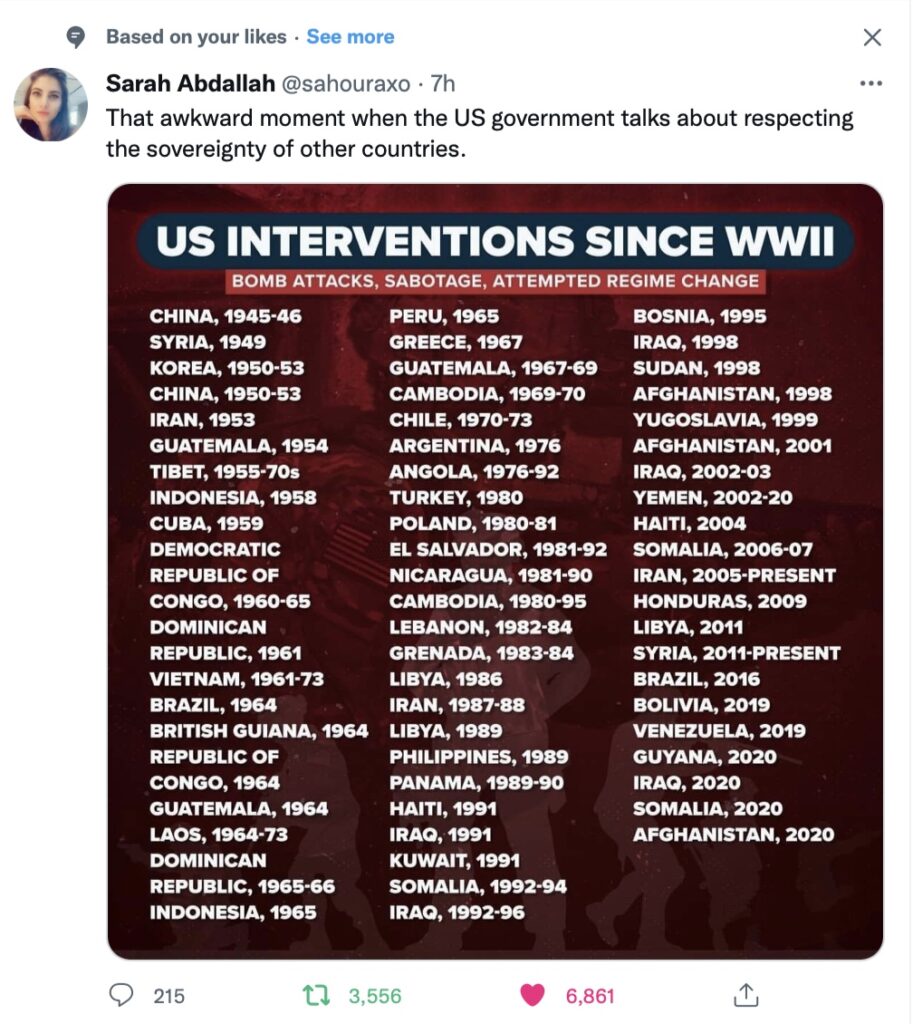In "Orwell Was Right: From free speech to "spheres of influence" to our passion for endless war, we've become the doublethinkers 1984 predicted," Matt Taibbi points out how our hair-trigger rage makes us fickle. We are consumed with one thing after the other and we no longer have time to consider nuances or our own contradictions.I have read Taibbi's brilliant analysis three times. I can't stop worrying. Not only about the war, but about the willingness of Americans to enthusiastically embrace double-standards. And then, when they no longer work, we ignore them and embrace new double-standards.
Moral panics erase memories. It’s their primary function. 9/11 wiped the national hard drive of everything from the third degree to My Lai to Operations Phoenix and Condor to the Church Committee to the School of the Americas to countless other shameful episodes, and the lessons learned from them. The Trump-Russia scandal blotted out Snowden, made the spooks the good guys again. 2016 rehabilitated neoconservatives, now reinvented as never-Trumpers, cleaning away the shame of Iraq, Abu Ghraib, Afghanistan, etc.
The “misinformation” panic wiped out the WMD fiasco, restoring honor to credentialed press. The DNC leak erased “Collateral Murder.” After George Floyd we hated cops, after January 6th we loved them. Ukraine now is openly being sold as a blue-pill cure for everything that went wrong during the War on Terror, including the recent defeat in Afghanistan. “Realism” is in disgrace, and “leadership,” “regime change,” and the “universal appeal of freedom” are back, only this time their primary backers are the upper-class cosmopolitan Democrats who marched against the simplistic “freedom against evil” plot neoconservatives tried to sell them twenty years ago.
We’re at the end of a twenty-year cycle that has taken what was once the oppositional-skeptic portion of the American population and seen them rallied behind the people they once hated the most. This has been accomplished by keeping us in a rage that always escalates and is never watered down by contradictions, thanks to mastery of “reality control” via “an unending series of victories over your own memory.”
The relentless parade of panics listed above (just a small sample; we’ve had dozens just in the last few years) makes those victories easy, and every time we switch targets, from Russians to neo-Nazis to cops to transphobes to insurrectionists to the unvaccinated to truckers and back to Russians again, the Church of Forgetting picks up new converts.
I know plenty of people, many of them friends and many of them quite well educated, who now seem to be determining their heartfelt opinions by checking to see what way the wind blows around their social network. It has become extremely disappointing over the past couple of years. It's like their self-critical modules have somehow been flipped to the off position en masse. For the most part, these are very smart people who have lost their ability to be curious and to make sense of the world around them on their own terms. It's like they've all been dusted with intellectual-coward dust. They no longer have time time or interest to listen to different thinking others. They listen to their own news sources, because other news sources are evil.
They have become hyper-vigilant to identity and difference. They write others off for the tiniest differences of opinion. Nothing less than moral purity will work if you want to be their friend in public. In private, it's somewhat different. In private you'll sometimes hear a different tune, a more measured perspective. I grew up Catholic. It reminds me of Catholics who chant in public that dead people can be alive again and that a virgin can have a baby. In private, they don't bring this stuff up because the chants served their purpose in public as cheap signaling so that they could bask in the social warmth of their group, not as meaningful information.
Productive political conversations are harder to find these days. I'm increasingly hearing the crowd-pleasing emotion-laden bluster leak into private conversations too. I'm hearing this from people who had been staunch pacifists all their life, people who despised George W. Bush for the deaths he caused with his discretionary and deceitful war. From these same lifelong peace-niks, I am hearing calls to directly confront the Russian military. These are people who were terrified that when Trump did his bravado schtick regarding North Korea, a country that might have had a nuclear bomb or two and might have had a missile or two. A couple years later, no problem! Ukraine is somehow worth it, even though we are cornering a man who they admit is a megalomanic nihilistic, arrogant hothead with thousands of nuclear bombs and thousands of missiles. Somehow, there is no need to do a cost-benefit analysis regarding Ukraine. And their getting lots of this aggressive talk from news media that leans to the political Left, media that hosts an unending stream of military generals and cheerleaders for the surveillance apparatus. Go figure.
Taibbi's article makes many excellent points. I encourage readers to sit down in a quiet place and to take it in line by line. One of Taibbi's points is that (for complex reasons I don't claim to fully understand) people are becoming much more willing to live only in the present. They are much more willing to seek out the outrage de jure. "News" media is happy to feed them the newest outrage-of-the-day in order to sell advertisements. I suspect that the willingness to glue one's self to the outrage machine is exacerbated by increasing amounts of mortality salience in the air (Terror Management Theory), which induces people to "circle the wagons," further enabled by the polarizing influences of social media and our bifurcated "news media." We can't ignore COVID, COVID Denialism and COVID hysteria as other contributors to the current climate of mortality salience.
In times of mortality salience, people are looking for a "rock," something upon which they can rely. They are increasingly looking to acceptance by a group or a "group identity" rather than embracing consistent principles (e.g. free speech, the rule of law and Enlightenment principles). Contentment to live in the present is what animals such as dogs excel at. They have no language, thus no need to critique their former positions with their current positions. Their world is their bowl of food and a someone to pet them on the head. For those who are willing to think fast, refusing to slow down to activate slower analytical thought, what is in front of you at this particular moment is always the only thing. As Daniel Kahneman described, What You See Is All There Is (WYSIATI). In recent times, I'm seeing increasing numbers of people who are not willing to go back to check the hard work of slower, methodical and self-critical thinking. They see slower thinking as an impediment to their preference: impulsive action. Perhaps they have been trained for too many years of watching TV actions shows where heroes tend to be reactive (whereas villians seem to willing to sit down and plan out their diabolical plans).
It's easy to find your tribe these days. For most people it is left versus right wing politics, A versus B. For increasing numbers of people (many that I personally know), their go-to reaction to danger is increasingly to seek the fast and easy safety of joining a group and parroting its talking points, despite the disastrous track record of this strategy. For them, the alternative strategy of engaging in heterodox free speech, inviting dissent, seeking out nuances and doing cost-benefit analyses has become heretical. It takes too damned long, despite its excellent track. In fact, for many people, engaging in the free speech that they ostensibly celebrate on the Fourth of July has become treasonous.
Back to Orwell's double-think. I struggled with this term until I translated it to double standards. There are two types of double-standards: A) my current actions versus my opponent's actions and B) my actions versus my own actions in the past. A key point by Orwell is that people in a state of crisis become oblivious to their own double-standards. We don't have time for the exquisite thought tools, including skepticism math and the need for evidence, that we learned during the Enlightenment! Many of the same people who clearly saw the their government lied to them about "weapons of mass destruction" and the "Gulf of Tonkin" incident have become some of the most fervent "believe the government" advocates. This, is despite decades of government lying about wars and decades of media outlets willingly amplifying the drumbeats of war. They know that they should slow down and be less gullible, but there is not time for that because fear is in the air and you and people who disagree with you are miniature versions of Hitler who you being instructed to hate! See this podcast where Taibbi discusses his book, Hate, Inc. with Joe Rogan.
All of this makes me wonder . . . are we really changing or is this the way we have always been? I suspect that social media is changing us, causing us to engage in more catastrophic thinking and all of the other things that cognitive behavioral therapy (CBT) is designed to prevent. Whatever the cause, increasing numbers of us seem to be wearing out cognitive dysfunctions as a fashion style, our way of showing each other that we care, even though we don't care enough to get or facts right.
That pit in my stomach is trying to tell me that I have already seen (or read about) America's best moments. It appears that all of them are in the rear-view mirror now. I hope I'm wrong, but it's getting harder and harder to convince me.






